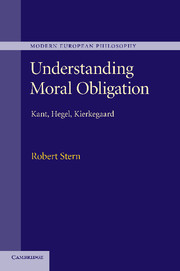Book contents
- Frontmatter
- Contents
- Acknowledgements
- References and abbreviations
- Introduction
- Part I Kant
- 1 Kant, moral realism, and the argument from autonomy
- 2 The argument from autonomy and the problem of moral obligation
- 3 Kant’s solution to the problem of moral obligation
- Part II Hegel
- Part III Kierkegaard
- Bibliography
- Index
1 - Kant, moral realism, and the argument from autonomy
Published online by Cambridge University Press: 05 January 2012
- Frontmatter
- Contents
- Acknowledgements
- References and abbreviations
- Introduction
- Part I Kant
- 1 Kant, moral realism, and the argument from autonomy
- 2 The argument from autonomy and the problem of moral obligation
- 3 Kant’s solution to the problem of moral obligation
- Part II Hegel
- Part III Kierkegaard
- Bibliography
- Index
Summary
My aim in this chapter is to differentiate the account I want to give of Kant’s ethics from what, in the Introduction, I called ‘the standard story’. I will therefore begin by setting out that story, and the way in which it interprets Kant and then the history of modern ethics that comes after him. Crucial to my re-telling will be the question of whether or not Kant subscribed to the argument from autonomy as that is put forward today by various constructivists and anti-realists in Kant’s name; my claim will be that he did not. I will then argue that as a result, therefore, we should recognise that the standard story has misidentified what Kant saw as the major issue, which was not to preserve our autonomy by finding an alternative to moral realism as an account of moral values, but to do so by finding an alternative to divine command theories as an account of moral obligation. The nature of this alternative account will then be considered in the next chapter.
The history of modern ethics: the standard story
I believe that very few would disagree with J. B. Schneewind’s observation that ‘[t]he conception of morality as autonomy was Kant’s fundamental innovation in moral philosophy’. But more contentious is exactly what that conception of autonomy consisted in, and what it committed Kant to in ethics and meta-ethics. According to most contemporary readers of Kant, the answer is that it committed him to a form of constructivism, and thus to a form of anti-realism in meta-ethics; and it further committed Kant and his successors to working out the issues and problems posed by such a position. The reason this is so, according to these interpreters, is that autonomy as Kant conceived it is incompatible with moral realism, so that Kant was obliged as a result to reject moral realism and to move towards constructivism. This connection is particularly prominent in the work of John Rawls: just as the position of ‘Kantian constructivism’ was one that was famously first identified as such by Rawls, so the reading that treats Kant as committed to the argument from autonomy goes back to his work also, where his reading has then been extremely influential on others. To understand the standard story of the history of modern ethics, we must therefore look at this connection more closely, beginning with a consideration of constructivism.
- Type
- Chapter
- Information
- Understanding Moral ObligationKant, Hegel, Kierkegaard, pp. 7 - 40Publisher: Cambridge University PressPrint publication year: 2011

